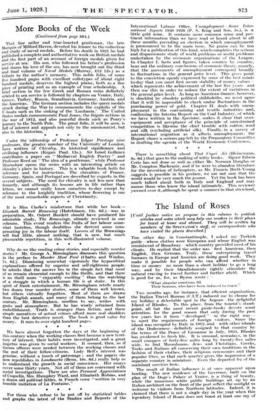The Island of Roses
[Until further ?ware we propose in this column to publish • articles and notes which may help our readers in their plans for travel at home and abroad. They will be written by members of the SpEcrAma's staff, or correspondents who have visited the plates described.] THE , other day in Constantinople, I asked my Turkish' guide—whose clothes were European and whose English was reminiscent of Broadway- - which country provided st of his clients. He replied that the order was first American, then English, then German. Truly, these enterprising travel bureaux in Europe and America are doing good work. They make it possible for people who can afford - whether in time or money no more than a short holiday to go a long way, and by their blandishments rightly stimulate the natural craving to travel further and further afield. Which is good for us, for, as Byron wrote "What singular emotions till Their bosoms, who have been induce(' to roam."
Two months ago, for instance, that efficient organisation, the Italian Travel Bureau (('.I.T.) induced me to choose for my holiday a delectable spot in the Aegean—the delightful Island of Rhodes. •• To this place, from the tourist's stand- point, all but the most recent guide-books devote scant attention, for the good reason that only during the past few years has it been " developed "- --in the right way - - to meet the requirements of foreign visitors. Since the island was occupied by Italy in 1912, und—with other islands of the Dodecanese—definitely assigned to that country by the terms of the Peace of Lausanne in July, Ma. Rhodes has awakened to fresh life. It is unusual, nowadays, in the small compass of forty-five miles long by twenty-five miles wide, to find Mussulmans. Jews and Christians, Greeks, Turks and Italians all conserving their own traditions in the fashion of their clothes, their religious ceremonies and their popular fetes, so that each quarter gives the impression of a separate country in miniature. Even the departed fez of the mainland survives here.
The result of Italian influence is at once apparent upon landing. The new residence of the Governor, built on the plan of the Doge's Palace at Venice, is a thing of beauty, while the numerous white public buildings set up by an Italian architect on the front of the port reflect the sunlight so welcome to visitors from Northern latitudes. Indeed, it is claimed that there is not a single day in the year when this legendary Island of Roses does not boast at least one ray of sun; for that very reason it was cherished by Apollo, and had its coins engraved with sun rays and the rose.
The history of Rhodes- goes back to the remote past, and though there are few traces of classical antiquity in Rhodes itself, a- motor_ trip across the island; through natural-- rock gardens, along the newly 'made- road to Lindo, is well worth undertaking to see the Acropolis, which the Knights of St: John of Jerusalem later changed into a fortress. It is to the Knights of St. John, who ruled over it for two centuries, and who gave hospitable shelter to pilgrims behind this Eastern rampart of Christianity, that Rhodes owes the mediaeval atmosphere which even the iconoclastic Turk has failed to dispel. The ancient walls constructed by the Knights, which enclose the town and the harbour, are well preserved; and one may ramble through narrow Turkish streets, with Moorish arches overhead, along clean pebbled passage-ways where many of the old stone houses still bear the coats of arms of their builders. The Turkish domination, which followed the occupation of the Knights, has embellished Rhodes with mosques, whose minarets and domes Make attractive contrast to the neighbouring mediaeval architecture. The Rhodes Archaeological Museum in the ancient Hospital of the Knights contains many interesting exhibits, some dating back to classical times. A marble statue of Venus has just" -been recovered from the sea. It reposes for the time being; in a sack in the Museum Garden—uncannily realistic in effect—but will shortly find its place amongst-the other tretistires recovered in a similar way.,
_
There- are several hotels, but the Hotel des Rose; built in "1927 by an Italian company, constitutes the centre of social life in Rhodes. The Government of the Aegean Islands, fully aware of the possibilities of the island as it resort, has lent material support to this enterprise. For about £1 a day one may stay in this palatial hotel, which rises on the .sea front and has its own private beach. It • is in eveiy. way comparable to good hotels in Europe, and the managenient• goes out of its way to promote the comfort of its guests. The island gives opportunities for sport. In Addition to deer hunting and sailing, there is a golf course Of nine holes, the longest of which does not exceed 290 yards-; but owing to the nature of the ground and its general tendency to rise towards the holes' the course is not •-•tte easy as the corn- parative shortness of the holes would suggest. The• greens are of hard earthy sand. There are motor-boat excursions to the neighbouring-islands, and cars may be hired for trips to the interifii. Rhodes niay be reached by 'weekly and fort- nightly services of steamships of the Sitmar Line, the Lloyd Triestino, the San Marco, the Puglia, &c., from Genoa, Naples, Venice, or Brindisi. As Rhodes lies in the direct line of com- munication between East. and- West, travellers on the .way to Jerusalem,- Constantinople, or Egypt may • easily visit the island without modifying their itinerary, providing' they choose a steamer which calls there.
A word about the accommodation On Italian ships may usefully be said. There still prevails in some quarters the idea that the food consists mainly of macaroni, and that the accommodation is not too comfortable. This is quite erroneous. The menus of the Sitmar Line ,itnd the Lloyd Triestino I found were pleasantly varied and of the best, and the cabin accommodation was equal to that afforded on much larger liners, and in some cases superior. The officers, who mostly speak French and some English, are courtesy itself.
. ;SPECTATOR.]











































 Previous page
Previous page